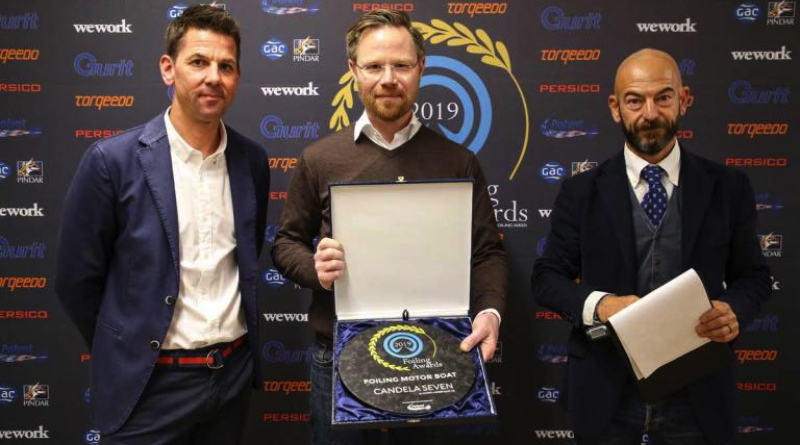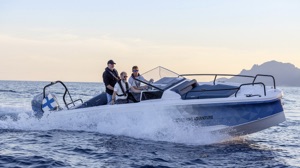Electric foiling boat wins another award
Candela’s electric foiling boat has taken on and triumphed over the fossil fuel boats in another awards program, this time the Foiling Week awards in which it was awarded the Foiling Motor Boat Award.
Foiling Week, which was held in Milan this week, is dedicated to all types of foiling boats and is the only global event dedicated to ‘the amazingly fast foiling boats, their sailors, designers and builders.’ One of the key sponsors of Foiling Week is Torqeedo and Candela’s award was presented by Oliver Glück, Torqeedo’s Vice President of Marketing (Left, above).
Candela is definitely ‘riding high’, winning the Best of Boat Award in November and also being nominated for the European Powerboat of the Year at BOOT Dusseldorf.
Electric foiling boat now in production mode
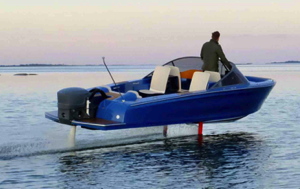 The speedboats’s hydrofoiling system, which uses sophisticated software and data gathering systems to adjust the hydrofoil wings hundreds of times a second, was developed by Gustav Hasselskog and his team over five years.
The speedboats’s hydrofoiling system, which uses sophisticated software and data gathering systems to adjust the hydrofoil wings hundreds of times a second, was developed by Gustav Hasselskog and his team over five years.
The boat is now well into production mode, with 10 boats already delivered and presumably even more orders on the way after this latest announcement! (BTW: You can see Candela at these upcoming Boat Shows: Tulln, Austria: Mar 5 – 8,; Allt För Sjön, Sweden: Mar 7 – 15 @ 6:00 pm; Sjøen for Alle – Norway: Mar 18 – 22)
While Candela was the only electric boat to come home with top honours, it was not the only electric boat considered.
Electric foiling boats also nominated in other categories
In the Design Award entries included:
Deepseaker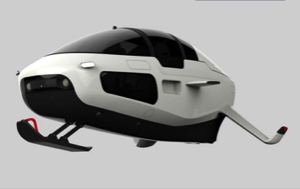 : the combination hydrofoiling boat /submarine from iSpace2O that can take 4 passengers flying atop the water at 23 knots (kmh/mph) and then dive to depths of 40/50 metres using an inflatable ballast tank under the cockpit. The electric motors are supplied by Hurracan and Deepspeed.
: the combination hydrofoiling boat /submarine from iSpace2O that can take 4 passengers flying atop the water at 23 knots (kmh/mph) and then dive to depths of 40/50 metres using an inflatable ballast tank under the cockpit. The electric motors are supplied by Hurracan and Deepspeed.
Flybus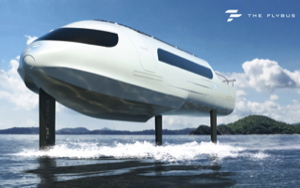 : The hydrofoiling 32 seat ferry with the ‘cabin of a business jet, the hull of a seaplane and the rear of a motorcycle boat with its teak deck’. The concept and design come from Alain Thébault and Anders Bringdal, who also developed the SeaBubbles flying watertaxi that is awaiting approval from the city of Paris as a commuter solution after a week of trial runs on the Seine in September.
: The hydrofoiling 32 seat ferry with the ‘cabin of a business jet, the hull of a seaplane and the rear of a motorcycle boat with its teak deck’. The concept and design come from Alain Thébault and Anders Bringdal, who also developed the SeaBubbles flying watertaxi that is awaiting approval from the city of Paris as a commuter solution after a week of trial runs on the Seine in September.
SeaBubbles is also moving into production mode, having finalized its cockpit shell and situating its facilities in Lorient, France.
F33 Spaziale Yacht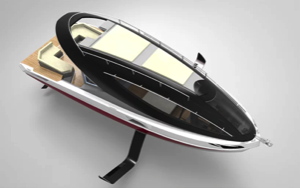 : This concept yacht from star designer Pierpaolo Lazzarini is a 33ft (10.5m) luxury yacht that is inspired by the lines of a spaceship. Unlike other only-electric vessels mentioned above, the Spaziale is designed to take either diesel propulsion or twin Tesla 387 kilowatt electric engines that can provide speeds of over 35 knots.
: This concept yacht from star designer Pierpaolo Lazzarini is a 33ft (10.5m) luxury yacht that is inspired by the lines of a spaceship. Unlike other only-electric vessels mentioned above, the Spaziale is designed to take either diesel propulsion or twin Tesla 387 kilowatt electric engines that can provide speeds of over 35 knots.
In the Sustainability category a new foiling workboat from Ireland’s Artemis Technologies and Denmark’s Tuco Marine Group lost out to the solar panels on the Hugo Boss IMOCA 60 yacht that will race in the Vendée Globe round -the-world sailing race in November.
The workboat combines the Artemis zero emission Efoiler propulsion system with a ProZero high performance boat as a proof of concept for the Aquaculture, Off Shore Energy, Water Taxi, Leisure and Defence sectors.
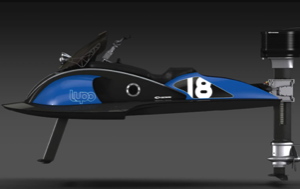 Last but not least for electric entries was the Lupo ‘foiling bike’ from France’s Bird-eMarine, a carbon fibre and titanium jetski that weighs only 180kg and can hit speeds of 30kmh with its 4.4kW motor.
Last but not least for electric entries was the Lupo ‘foiling bike’ from France’s Bird-eMarine, a carbon fibre and titanium jetski that weighs only 180kg and can hit speeds of 30kmh with its 4.4kW motor.
There seems to be no doubt that hydrofoiling is going to become an increasingly important segment in electric boats. While batteries are improving almost literally by the month, it is still a challenge to provide the continuous power that a boat needs – especially a planing boat – to extend the range.
The reduced drag of a hydrofoil design has a dramatic influence not just on the range, but also the speed a powerboat can achieve. For these reasons, expect a lot more ‘flying boats’ to appear in the coming years.

